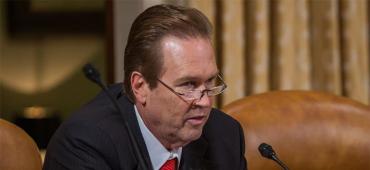
With America seeing the highest number of suicides since World War II, a congressman from the Sunshine State is backing a proposal to create a universal suicide prevention hotline.
Last month, U.S. Rep. Seth Moulton, D-Mass., and U.S. Rep. Chris Stewart, R-Utah, brought out the “National Suicide Hotline Designation Act.” The bill would designate “9-8-8” as a universal telephone number for the national suicide prevention and mental health crisis hotline system, which is run by the National Suicide Prevention Lifeline and the Veteran’s Crisis Line.
“This bill will save lives. When your house is on fire, you don’t have time to look up the fire department’s phone number—that’s why we have 9-1-1. In the same way, you should know what number to dial when a friend, a loved one, or you yourself are experiencing a mental health crisis,” Moulton, who ended his bid for the Democratic presidential nomination last month, said when he unveiled the bill. “This is a major milestone on the road to where mental healthcare in America is just part of healthcare, period. It’s one part of ending the stigma around mental health and making Americans healthier and stronger.”
“I am truly honored to lead on this bill to get a three-digit, easy-to-remember, dialing code for the National Suicide Prevention Lifeline. Suicide hits close to home with an average of two Utahns taking their life every day. This dialing code is an essential step in providing critical resources to those in emotional distress,” Stewart said.
Last year, Stewart got a bill passed and signed into law to have the federal government find the best three-digit dialing code for the National Suicide Prevention Lifeline. Earlier this month, after studying the matter, the FCC recommended “9-8-8.”
On Monday, U.S. Rep. Vern Buchanan, R-Fla., who sits on the powerful U.S. House Ways and Means Committee, announced he was cosponsoring the bill. Five other congressmen from Florida--Democrat U.S. Reps. Alcee Hastings, Al Lawson and Darren Soto and Republican U.S. Reps. John Rutherford and Michael Waltz--are cosponsoring the bill.
Buchanan noted suicide is the “tenth leading cause of death in the United States, claiming 47,000 lives annually” and noted a rising number of children attempting suicide.
“We need to do a better job getting assistance to those in mental health crisis,” Buchanan said. “By making it easier to reach the National Suicide Prevention Lifeline and devoting resources towards these crisis centers, we can have an immediate impact in reducing suicide.”
“The suicide rate in the United States is at its highest level since World War II and has risen by 33 percent since 1999,” the congressman’s office noted. “Tragically, suicide attempts among children have skyrocketed in recent years with poisoning attempts more than doubling. The Journal of Pediatrics has reported that poisoning attempts by girls aged 10 to 12 rose by more than 265 percent between 2010 and 2017, with an increase of more than 140 percent for girls aged 13 to 15 over the same period.”
The bill was sent to the U.S. House Energy and Commerce Committee last month. So far, there is no companion bill over in the U.S. Senate.
The bull has the support of a host of groups including the American Association of Suicidology, the American Legion, the Association for Behavioral Health and Wellness, Behavioral Health Link, Behavioral Health Response, Centerstone, Connections Health Solutions, the Jason Foundation, the Kevin and Margaret Hines Foundation, National Action Alliance for Suicide Prevention, the National Association of County Behavioral Health and Developmental Disability Directors, the National Association for Rural Mental Health, Now Matters Now, InSight Telepsychiatry, and RI International.
Centerstone, a mental health facility in Bradenton, is also backing the bill.
“Suicide is preventable. Everyone in our communities, in our nation, has to be involved,” said Melissa Larkin-Skinner, the CEO of Centerstone Florida. “We all have to work together to achieve zero suicides. Thank you to Congressman Buchanan for recognizing the need for a National Suicide Hotline three-digit number that is easy to remember.”


